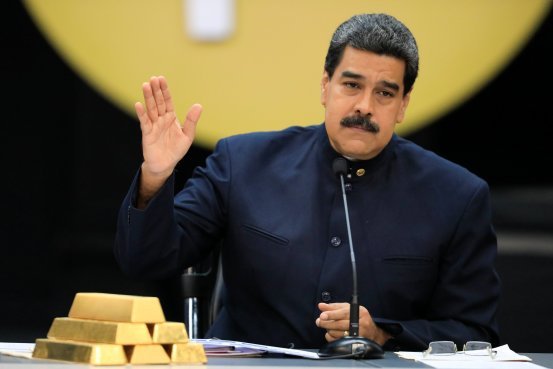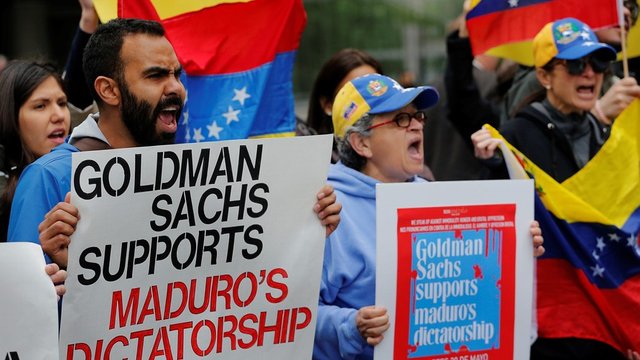Venezuela’s oil company makes $90 million bond payment to Goldman unit

Venezuela's President Nicolás Maduro is up for re-election in May. PHOTO: MARCO BELLO/REUTERS
Venezuela’s cash-strapped government stopped paying its foreign debt months ago. But a unit of Goldman Sachs GS 1.74% Group Inc. recently received payments of tens of millions of dollars for bonds that ignited controversy last year when they were purchased at a big discount, according to people familiar with the matter.
The Venezuelan government made the payment in November, but the money had been held up by a clearing house that processes these payments over concerns that it may have been in violation of U.S. sanctions, these people said.
The purchase in May by Goldman’s asset management arm sparked charges that the New York firm was providing a financial lifeline to Venezuela’s embattled government. The public anger seemed to catch Goldman off guard, in part because the asset management arm hasn’t usually been prone to controversy.
Analysts say the $90 million payment on Friday for the bonds, which are held mostly by Goldman Sachs Asset Management, could amount to the final payment made by the government of President Nicolás Maduro —on any of its bonds.
He has pledged that Venezuela will pay all its debts, but the government hasn’t made any new payments since late last year, according to data from the central bank obtained by investment bank Caracas Capital Markets.

Venezuela is suffering an economic and humanitarian crisis. It has been battered by rapidly declining oil production that accounts for virtually all of its hard currency income. Mr. Maduro is up for re-election on May 20. Local polls show his challenger Henri Falcón as a clear favorite, but the U.S., European Union and Canada have raised questions about the legitimacy of the election process and many political analysts expect Mr. Maduro to prevail.
For Goldman Sachs, the coupon payment for the bonds issued by Venezuela’s state oil company Petróleos de Venezuela SA may be a small consolation for what has so far been a losing bet. The asset management arm acquired the bonds due in 2022 with a $2.8 billion face value at a 70% discount.
A Goldman Sachs spokesman declined to comment.
Critics say that purchase helped prop up Mr. Maduro’s authoritarian regime when U.S. sanctions had limited his ability to raise cash and ratcheted up the pressure on him. The bonds Goldman bought last year had been held by Venezuela’s central bank, so the proceeds of the sale went straight to the Maduro government.

The Trump administration has barred U.S. investors from trading new bonds with Mr. Maduro’s government, and the sanctions have complicated any restructuring effort. Spokesmen for Venezuela’s central bank and finance ministry didn’t immediately respond to calls seeking comment.
Sen. Marco Rubio (R., Fla.) was among the detractors, tweeting that Goldman Sachs had given the Maduro government a “$2.8 billion lifeline.”
Since the transaction, these bonds have traded infrequently and are offered at a deep discount to other Venezuelan bonds because major brokerages refuse to price them and most other traders refuse to buy them, according to a March report from the Graduate Institute of International and Development Studies and Duke University School of Law.
A number of bond investors said that their firms prohibit them from even talking about the PdVSA bonds because they have become a political lightning rod.
The PdVSA bonds were quoted at 23.75 cents on the dollar Tuesday, according to Thomson Reuters, versus 26.75 cents on the dollar for a similar bond due in 2024.
The Venezuelan government hasn’t issued any international public debt in several years.
The government began defaulting on its bonds in November. Venezuela has approximately $150 billion in outstanding foreign debt and approximately $9.5 billion in reserves. Approximately $2.5 billion in debt is now in default, according to Caracas Capital, and the government’s promise to attempt a restructuring has fizzled.
Mr. Maduro’s political rivals called the PdVSA 2022 bonds illegal because they were never approved by the opposition-controlled congress, also known as the National Assembly.
Protesters showed up at Goldman Sachs’ office in New York following the deal, some holding signs that read “hunger bonds.”
Sheila Patel, chief executive of GSAM’s international division, told Bloomberg in a recent interview that the transaction was a “learning experience.”
—Kejal Vyas contributed to this article.
...Thanks for watching...
Hi! I am a robot. I just upvoted you! I found similar content that readers might be interested in:
http://www.paywallnews.com/business/Venezuela-Is-in-Default--but-Goldman-Sachs-Just-Got-Paid-.rk31LOqiz.html
Downvoting a post can decrease pending rewards and make it less visible. Common reasons:
Submit